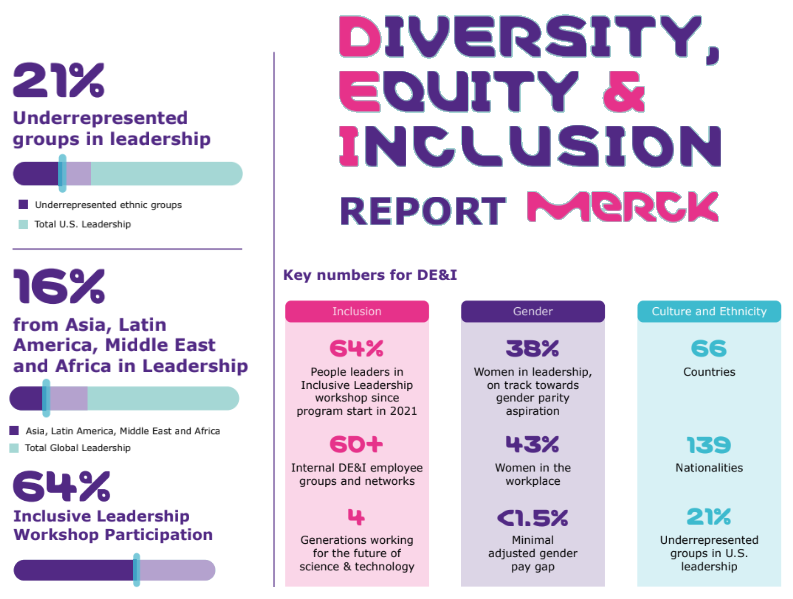Targeting 30% leadership from underrepresented groups by 2030: Merck's DEI report

According to a Diversity, Equity, and Inclusion report by Merck Group that covers its 64,000 employees across 139 countries, "87% of globally surveyed employees reported receiving fair treatment in the workplace."
The survey aimed to gather insights on gender equity, cultural and ethnic considerations, opportunities for underrepresented social groups, and the effectiveness of DEI initiatives across the global healthcare organisation.
Belén Garijo, Executive Board and CEO of Merck said, “Championing a diverse workforce helps us better understand the unique needs of our stakeholders, exceed our customers’ expectations, remain economically and socially sustainable, and, most importantly, drive the kind of groundbreaking innovation that advances human progress. This Report reflects our commitment to being accountable and transparent in setting meaningful aspirations, developing plans, making progress, and measuring and disclosing our achievements around DE&I.”
Fostering gender equity in the workplace
Currently, Merck has about 38% women in leadership positions (increased from roughly 11% in 2015), and nearly 43% of the global workforce consists of women. The organisation aims to achieve gender parity in all leadership positions by 2030, as stated in the report.
Cecilia Barriga, Regional Field Marketing Manager Life Science of Merck Peru, said, “I value that we can engage in more discussions about women in leadership, encouraging more women to consider their careers within the organisation and in leadership as well.”

Promoting diversity and inclusion in the workplace
With approximately 24% of its workforce based in the U.S., Merck Group is committed to attracting and supporting 'underrepresented racial and ethnic communities' within the region. The company also aims to elevate the representation of employees in leadership roles from this demographic, aiming to increase from the current 21% to a goal of 30% by 2030.
Furthermore, the healthcare firm strives for a global leadership representation of 30% by 2030, encompassing employees from Asia, Latin America, the Middle East, and Africa, regions that currently contribute 40% of the group's sales.
To foster an inclusive culture among its employees, the organisation provides dedicated support through tools and training initiatives such as the Inclusive Leadership Workshop. These efforts are reinforced by global leadership engagements, peer coaching, continuous self-reflection, and a strong commitment to leadership accountability. Notably, group leaders demonstrate a participation rate of approximately 64%.
Sharing her experience with this initiative, Angela Bause, Head of Program Management Office in Integrated Supply Chain Electronics at Merck Germany, said, “The Inclusive Leadership Workshop empowered me as a leader to consistently challenge myself and others on questions like: Did I treat a person respectfully? Did I cross a line? Do I create an environment of psychological safety? Additionally, the workshop helped me identify and strengthen my own values as a leader, as well as advocate for them and implement them daily.”
Saori Miki, Head of Customer Excellence APAC Life Science, Japan, also shared, “The Inclusive Leadership Workshop provides a safe environment to freely share your ideas and encourages the journey for all of us to lead and foster a truly diverse, equitable, and inclusive work environment.”
Moreover, Khadija Ben Hammada, CHRO of Merck, shared her views on ‘the significance and essence of empathetic leadership’, stating, "Empathetic leaders forge connections, lend an ear, instil inspiration, and kindle motivation. They foster inclusivity, possess self-awareness, and excel in connecting beyond conventional work subjects. By gauging the team's sentiments, comprehending their needs, and ensuring their voices are heard, they acknowledge our shared desire for purposeful and successful work. Through empathy, remarkable leaders gain a deeper understanding of how we can achieve our best in the workplace."
Measuring effectiveness of DEI Initiatives
Merck's global employee engagement survey (conducted in 2022), served as a platform for gathering feedback from all employees, providing insights into their experiences of DEI initiatives. The report highlighted that around 81% of surveyed employees conveyed satisfaction with the collaborative team atmosphere, and an impressive 84% agreed that their managers foster a culture of trust where feedback is genuinely appreciated.
“The survey seeking the impact of DEI initiatives identifies barriers to employment, advancement, engagement, and inclusion as well as provides necessary accommodations and measures our progress,” the report stated.
Adrienne Dawson, Head of DE&I, North America, added, “Self-identification is an important tool to gather diversity data about our organisation. When we have a better understanding of who our employees are, we are better positioned to develop meaningful strategies and initiatives that help to create a more inclusive workplace.”
Shiv Kumar, Head of HR, Merck India, shared, “Gender is more than a mere binary, and our employees should not be forced to make a choice. This applies to using the restrooms as well. Hence, in India, we have created restrooms that are gender-neutral and allow for a safe space for all, irrespective of one’s identity. Safe and inclusive workspaces are not a privilege; they are a human right.”
















